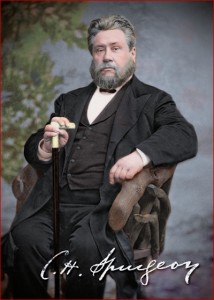 “I am content to live and die as the mean repeater of scriptural teaching, as a person who invented nothing, as one who never thought invention to be any part of his calling, but who concluded that he was to take the message from the lips of God to the best of his ability and simply to be a mouth for God to the people, mourning that anything of his own should come between, but never thinking that he was somehow to refine that message, to adapt it to the brilliance of this wonderful century, and then to hand it out as being so much his own that he might take some share of the glory of it.” – C. H. Spurgeon, as quoted in H. M. S. Richards, Feed My Sheep (Review and Herald, 1958), 38
“I am content to live and die as the mean repeater of scriptural teaching, as a person who invented nothing, as one who never thought invention to be any part of his calling, but who concluded that he was to take the message from the lips of God to the best of his ability and simply to be a mouth for God to the people, mourning that anything of his own should come between, but never thinking that he was somehow to refine that message, to adapt it to the brilliance of this wonderful century, and then to hand it out as being so much his own that he might take some share of the glory of it.” – C. H. Spurgeon, as quoted in H. M. S. Richards, Feed My Sheep (Review and Herald, 1958), 38
“I have found, in my own spiritual life, that the more rules I lay down for myself, the more sins I commit. The habit of regular morning and evening prayer is one which is indispensable to a believer’s life, but the prescribing of the length of prayer, and the constrained remembrance of so many persons and subjects, may gender unto bondage, and strangle prayer rather than assist it.
To say I will humble myself at such a time, and rejoice at such another season, is nearly as much an affectation as when the preacher wrote in the margin of his sermon, “Cry here,” “Smile here.” Why, if the man preached from his heart, he would be sure to cry in the right place, and to smile at a suitable moment; and when the spiritual life is sound, it produces prayer at the right time, and humiliation of soul and sacred joy spring forth spontaneously, apart from rules and vows.
The kind of religion which makes itself to order by the Almanack, and turns out its emotions like bricks from a machine, weeping on Good Friday, and rejoicing two days afterwards, measuring its motions by the moon, is too artificial to be worthy of my imitation.
Self-examination is a very great blessing, but I have known self-examination carried on in a most unbelieving, legal, and self-righteous manner; in fact, I have so carried it on myself. Time was when I used to think a vast deal more of marks, and signs, and evidences, for my own comfort, than I do now, for I find that I cannot be a match for the devil when I begin dealing in these things. I am obliged to go day by day with this cry,—
“I, the chief of sinners am,
But Jesus died for me.”
While I can believe the promise of God, because it is His promise, and because He is my God, and while I can trust my Saviour because He is God, and therefore mighty to save, all goes well with me; but I do find, when I begin questioning myself about this and that perplexity, thus taking my eye off Christ, that all the virtue of my life seems oozing out at every pore.
Any practice that detracts from faith is an evil practice, but especially that kind of self-examination which would take us away from the cross-foot, proceeds in a wrong direction.” C.H. Spurgeon, Autobiography, Vol. 1, pp. 161:
